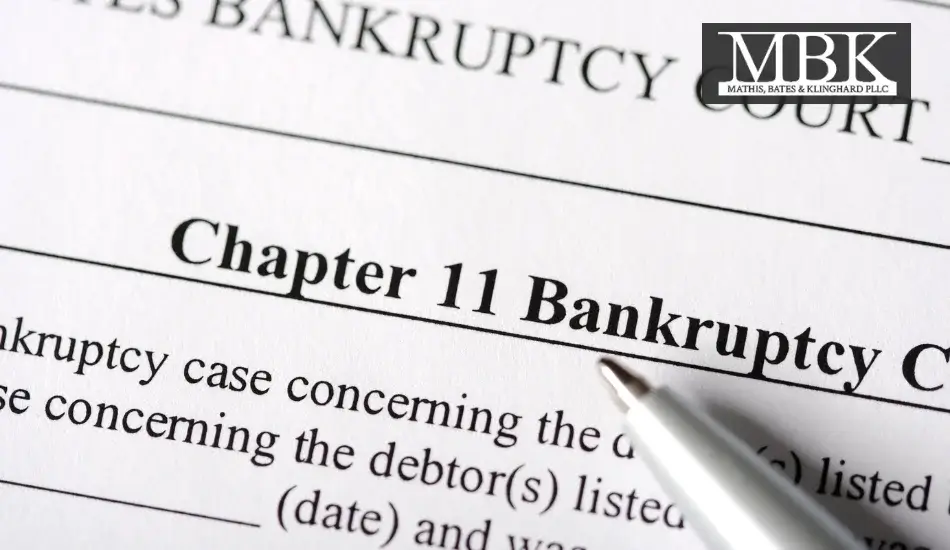|
|
Last Modified on Apr 05, 2025
Filing for bankruptcy can feel overwhelming, especially if you’re unsure what the process involves or how it will affect your life. Many who are considering doing so ask, “What happens when you file for bankruptcy in Tennessee?” Your bankruptcy outcome relies on your selected bankruptcy type, your financial condition, and your level of preparation.
Bankruptcy serves as a legal mechanism to halt creditor harassment, prevent foreclosure, and eliminate certain debts. However, it requires adherence to specific rules and court involvement within set timelines.
For the fiscal year ending in September 2024, the Administrative Office of the U.S. Courts recorded 504,112 bankruptcy filings, which showed growth from the previous year’s 433,658 cases. There were almost 300,000 Chapter 7 filings and over 90,000 Chapter 13 filings in the United States between September 2020 and September 2024. Knowing each stage of either Chapter 7 or Chapter 13 bankruptcy can alleviate stress and increase your chances of success.
Filing the Petition With the Tennessee Bankruptcy Court
Individuals must submit a petition to their local federal bankruptcy court as their initial action when filing for bankruptcy. Residents of Tennessee submit their bankruptcy petitions through the U.S. Bankruptcy Court for the Middle District of Tennessee, which maintains offices in Nashville, Cookeville, and Columbia. Your bankruptcy petition needs to contain comprehensive financial declarations that detail your debts, assets, income, expenses, and creditors list.
When you file for bankruptcy, the court automatically issues a stay, which halts most debt collection actions right away. Filers in the Nashville area gain advantages from nearby court resources and local trustee offices, which assist in managing procedures and scheduling essential steps, such as the mandatory 341 meeting.
Attending the 341 Meeting of Creditors
Upon submitting your filing documents, you must go through a 341 meeting, which is known as the Meeting of Creditors. Middle Tennessee residents typically attend this meeting in downtown Nashville. Creditors have permission to participate and pose questions during the meeting, but they rarely exercise this right.
A bankruptcy trustee controls the meeting while verifying your identity and examining your financial disclosures. The meeting lasts around 10 to 15 minutes, but it serves as an essential element in the process. Effective preparation, combined with truthful disclosure, can keep your case moving forward without trustee objections or delays.
Understanding the Role of the Bankruptcy Trustee
When you submit your bankruptcy filing, the court assigns a bankruptcy trustee to oversee your case. Trustees in Nashville and its adjacent counties receive their appointment from the Middle District Court. They conduct document reviews, supervise the 341 meeting, and manage liquidations or payment arrangements.
The trustee evaluates non-exempt property in Chapter 7 cases to decide if assets need to be sold for creditor repayment. The trustee takes control of your repayment plan while distributing payments to creditors under Chapter 13. Tennessee trustees operate under strict federal and district court protocols to uphold justice while supporting legal enforcement.
The Discharge and Rebuilding Process in Tennessee
Once you attend the 341 meeting, finish debtor education, and follow court orders, you could obtain a bankruptcy discharge. Chapter 7 bankruptcies usually result in a discharge after 60 to 90 days. Chapter 13 requires debtors to finish a repayment plan before discharge, which generally takes between three and five years.
After receiving your bankruptcy discharge, you will no longer have legal accountability for the debts included in your bankruptcy. Many Nashville residents choose to rebuild their credit using secured credit cards or budgeting tools. Nonprofit financial counseling services exist in Tennessee to support people in restoring their financial stability for the long term following bankruptcy.
FAQs
Q: Do I Have to Go to Court When I File for Bankruptcy in Tennessee?
A: Filers rarely have court appearances, but they do need to show up for the 341 Meeting of Creditors. The bankruptcy trustee conducts your case review in a meeting room or through virtual means rather than in a courtroom. Court appearances happen only in cases with disputes, like creditor objections or exemption challenges.
Q: What Is the Automatic Stay?
A: A court order, known as the automatic stay, takes effect immediately upon the filing of a bankruptcy petition. The automatic stay halts the majority of collection activities, such as wage garnishments, civil claims, foreclosure procedures, and creditor phone calls right away. The stay continues to protect you while your case remains active or until the court decides to lift it.
Q: What Happens If My Bankruptcy Is Denied or Dismissed?
A: A dismissal of your case eliminates the automatic stay, which permits creditors to restart collection activities. Incomplete paperwork, missed deadlines, or non-attendance at the 341 meeting are typical causes for case dismissals. You can refile after certain dismissals, but face limitations when filing multiple times. Being organized while meeting all court requirements remains essential.
Q: Will Filing for Bankruptcy Wipe Out All My Debts?
A: Through bankruptcy proceedings, borrowers can clear various unsecured debts, including those from credit cards, medical expenses, and personal loans. Certain debts, such as student loans, recent taxes, child support, and alimony, remain non-dischargeable in bankruptcy cases. Your financial situation and bankruptcy type determine the results. Evaluating your entire debt portfolio is essential for determining which debts can be absolved.
Contact Mathis, Bates & Klinghard PLLC for Your Bankruptcy Filing Needs
Bankruptcy filing in Tennessee follows a defined legal procedure that gives people significant respite from their excessive debt burdens. Knowing the process, from filing to discharge, is critical when choosing between Chapter 7 for a fresh start or Chapter 13 for asset protection and debt reorganization. The right preparation allows you to move through bankruptcy with certainty and a clear understanding.
Mathis, Bates & Klinghard PLLC’s Nashville bankruptcy attorneys can empower you to manage your financial future. We can review your case, analyze your debts, and determine the ideal way forward. Our team can represent clients through every stage of bankruptcy, from petition filing to discharge, while protecting your rights and answering all your questions. Reach out to us now to book a consultation and discover your optimal financial strategy.








